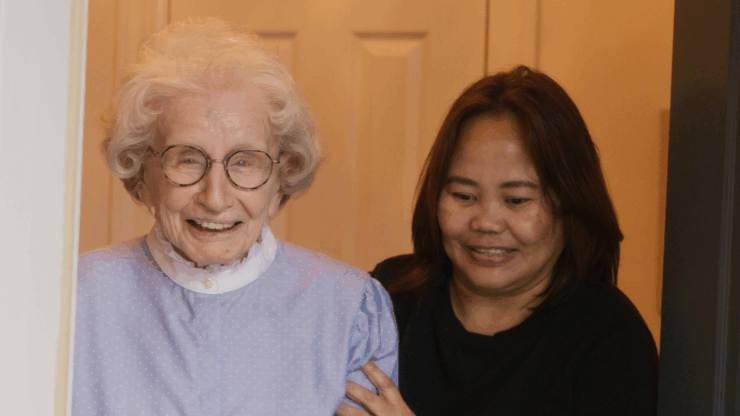Why Caring Matters with Dr. Craig Kasper
Last Updated March 3, 2025 3 Min WatchIn this insightful conversation, Dr. Craig Kasper, Founder and Managing Director of NYHD, and Bal Agrawal, Founder and CEO of LifeWorx, explore the profound importance of personalized care and its impact on health and well-being. Dr. Kasper highlights the connection between optimized living and the services LifeWorx provides, while Bal shares his journey from a personal caregiving challenge to building a company dedicated to bringing safety, trust, and joy to individuals and families.
Bal emphasizes the importance of treating every client with compassion, listening deeply to their needs, and creating tailored care solutions. The discussion delves into the challenges of aging gracefully, the delicate nature of conversations about caregiving, and the value of collaboration between families and caregivers to enhance quality of life. With a focus on simplicity, empathy, and community connection, “Why Caring Matters” showcases how LifeWorx combines expertise and humanity to make a meaningful difference in people’s lives.
Transcript
Dr. Craig Kasper:
Okay, everyone, welcome back to our second episode of NYHD Life. This is a brief video series that we started from our practice here, NYHD Institute for Hearing Imbalance, to kind of take what we do inside of our practice and speak to people that are in our community that can help us all understand how to live a longer, healthier, more optimized life. And I can’t think of a better guest to have on this particular episode of the show than a gentleman by the name of Baal. Now, Baal is a really interesting guy and we’ve come to know each other over the past year. And he is the founder and CEO of a company called LifeWorx, which is based here in New York, but it’s growing pretty quick. And our work in our practice is focused on optimization and living longer, healthier lives, particularly when we talk about hearing and balance. But it rolls into many other things as well, and ball’s work. And his company, LifeWorx really sits at the core of living a longer, healthier life as well. So what I’m going to do is I want to bring a ball in right here and in a second. There he is. How you doing?
Bal Agrawal:
Good. Hello, Dr. Casper.
Dr. Craig Kasper:
It’s great to see you again. Yeah, good to see you. You look great. I appreciate that. Thanks. I hope you had a good holiday and I know that you’re busy, but I really do appreciate you taking the time to spend with us today.
Bal Agrawal:
I did, and I appreciate your time and I appreciate the kind words you had to say about LifeWorx.
Dr. Craig Kasper:
We’re going to talk a bit about LifeWorx in a second because it really stands at the core of a lot of things that stand at the core of our philosophy as well in our practice. But oftentimes what I really prefer to do is you started this company and at the center of it is your history. So I’d love to dig in just a little bit to get a better perspective for myself and for everybody who’s watching and listening to this in terms of where you came from. And then ultimately I just want to work up to how we started LifeWorx.
Bal Agrawal:
Well, thank you. Thank you, Dr. Casper. So I had a corporate life and a good degree, and really life was going along a great career. And along the way my wife fell ill unfortunately, and she passed away. This was a while ago, about 20 years ago, and I was raising my son, but it came to my personal experiences that through needing help at home, random people came in my own house and some I could not trust, some didn’t have the skill. And being an engineer, I wanted to solve this problem and saying, if somebody needs help at home, they shouldn’t really have to depend on random people, especially in your home and especially in times of need. So I took on this mission not knowing where we’ll go and how we’ll end up of sort starting someplace in my basement of the house. And here we are 15 years later, learning still, but serving a lot in the community. And that’s wonderful,
Dr. Craig Kasper:
And you’re doing some great work. And we came to know each other through one of your seminars not too long ago here in New York where you had invited a physician colleague, someone who is in the LifeWorx world, to talk specifically about one thing that impacts a lot of people as we go through life, specifically cognitive decline, Alzheimer’s and dementia. And I thought that it was massively educational for everybody that was there, but you’re not just focused on the neurology side of things. What you’re focusing on is really helping people to age gracefully in place, right? We’re trying to keep people in their
Bal Agrawal:
Homes. Absolutely. You use the key word that I really want to believe in all the time, grace. And I know people think when you get old, your dignity goes away and your privacy goes away and joy and fulfillment starts to diminish. I really think the other way, I really believe that there’s a potential for us to provide care and help to so many people in so many ways and bring that just rather than just safety and security and medical care, we can make good things to their home. That seminar that you talked about, Dr. Fille, he’s a really well-known person. He started drug discovery for Alzheimer’s and he’s on our advisory board, his connection with what he teaches, and you talk when you practice about hearing and hearing loss, it’s amazing how things are connected in our brain hearing and vision and in your own psychology in terms of growth and fulfillment of the individual.
There’s so little knowledge available for people who are 75 to 95 year olds, how to really seek good resources, do everything that they can do. I visit some of my clients and I see them struggling, and it’s irony that you spend 75 years of your life learning things, but you don’t know how to unfold it within 75 and 95. And things surprise us. We all are very hopeful, but I think it’s really my mission here is to bring the best home, best help in people’s home. And we do that by doing three things. First, we listen to the customer in great depth. We try to understand what’s going on in your home with your family, with your environment, what you like, what you don’t like, what bothers you, personality, everything. And then we connect them with a group of really skilled and talented and people with good personality who can really bring joy and fulfillment along with safety and care. We give them choices. And most important thing that we do is keep everything so simple.
Dr. Craig Kasper:
Sure. Maybe we can back up just a little bit before we get to the service component of it. Some of the challenges that we face as we go through life, because changes in our health oftentimes will occur very gradually over time, and we might not realize that limitations are starting to creep up on us. And I hate to use the word limitations because I don’t believe in limits per se, but the reality is that sometimes there’s mobility limitations. Sometimes there may be cognitive decline, there might be other things that are impacting our health and wellbeing, and equally as important, our safety. So how do we start to have a conversation? Let’s just say that we have a conversation with either the individual or perhaps even more likely a loved one who’s very concerned about their parent or their grandparent, let’s say. How do you begin to have those conversations? Because it is a very delicate subject, and we do not want to step on anyone’s independence, and I don’t want this to come across the wrong way, but ego to a certain extent, right?
Bal Agrawal:
It is. As we get older, we’ve become in many ways vulnerable, but stronger in what we want
And our personalities. So it’s a very difficult conversation to have and family members or anyone that wants to talk to an elder saying, you need care. Have to open the conversation very carefully because people think that elders are, you can tell them something, you can lie to them or you can fake them, but they’re really smart people. Everybody who’s 80 years old is very smart person. And Bess, just to be honest about it, but also relate to not saying something is wrong with you and you need help is saying, I’m concerned. I’m worried. Can you help me? And I think if you put burden on yourself, the person will listen saying, yeah, I understand you are worried. What can I do to help you? Not worried somebody’s daughter or son. When they say to their parents that I’m worried about you, they’ll listen to it more than saying, you need help. If somebody has been independent for 80 years, they want to stay independent. They don’t want somebody to be intruding in their life, especially in their private life.
Dr. Craig Kasper:
Yeah, it’s very challenging to, I liked what you said actually, in terms of we become smarter, but we also become, we’re more vulnerable in many respects, but we’re also much stronger in many respects in terms of the way that we view ourselves in the world. So you had a challenging beginning catalyst in terms of your personal experiences that prompted you to think about these issues. I’m always interested also in terms of how someone creates something from nothing. Right? So you said you started in your basement.
Bal Agrawal:
Yeah. So I think it’s very important to have patience because things are not going to go right. It’s not just easy. Life doesn’t go in a straight line. We started with trying to help people. My first initial project was to just provide advice, give them information, and soon we learned that people don’t want advice, they want solution. That’s why if you look at all those partial meal kits that use people ship at home, it’s not working. Nobody wants half cooked meal, nobody wants half baked cookies. Give me a solution, help me. So then we started providing the services and we realized that more and more services where the needs are versus want is the need is really care for children, care for elders, care for their home, the basics. 1, 2, 3. And we focused on those and we did make some mistakes. We drifted into digital world sooner than what is ready. And we spent some time and energy, but I think we are very solid where we are focused now for the last five years. And I would just suggest that anybody that wants to start business know that unknowns will come, have reserved, have patience, and stay focused. You’ll get there.
Dr. Craig Kasper:
Of course. Yeah. So let’s talk a little bit more about LifeWorx. From my outsider view looking, and there’s a lot of differentiating factors because there’s a number of kind of home care types of organizations that might be out there, but there’s a clear difference between what you provide and what most of the other organizations might provide. And I think at the core of it is this concept of empathy and care that I see from you that goes all the way through your entire staff. This is not a commercial for LifeWorx. This is just my humble opinion of what I see and what I’ve experienced. But how do we find the right organization to help us once we’ve had that conversation with our loved one or once we’ve come to grips ourselves that we might need some help? How do we determine who to go to?
Bal Agrawal:
Well, I think first of all, it’s all about people. So any organization that you look into, when you look into the eyes of their employees or their caregivers or their customers, are they looking at each other in a warm and compassionate manner? Rule number one, it is really the basis of everything. If people are not compassionate and caring, the organization can be built on technology or marketing. Nothing works. And I think we use that internally. Everyone in my team has a compassion as a component. The compassion that our customers have for us is unbelievable. We should review, see the reviews and what they say about us. That’s the fuel. That’s fuel for us. There’s no better fuel than customers telling you that we’re doing the right thing. And then you want to do better more. And every caregiver that comes to us is also feels the same way. They have a sense of belonging. They bring Christmas cookies and wine bottles when they come back from their country and they know that we really care for them. So simple example, caregivers want good pay and a job that really that they like and get paid. Every week we develop a system. Every one of our caregivers get paid every week on a Monday for the week they worked before and a hundred percent accurate, simple thing like that matters to those people. And you have to think about that.
Dr. Craig Kasper:
I think it matters to everybody. I think that we’ve lost the concept of care across businesses in many cases. I think it’s coming back, but I do believe that that’s a differentiating factor in many respects. So once we decide that we need care, we found the right organization such as LifeWorx, what’s the next step?
Bal Agrawal:
I think you want to be candid with the person you’re talking to or care coordinators or our care managers will talk to a customer for maybe half an hour, an hour. And sometimes we get surprises once the reality shows up. But tell us exactly what’s happening. Tell us what the home is like, what your mom or dad is like or what you need so that we can tune in and get you the right help once the more detail we know, the better it is. And then choose the right caregiver. Because you always give choices. We might give you three or four choices. Meet them, talk to them, see who fits the personality. It’s as simple as having a good person in your home. And once that is done, everything’s easy. Everyone in the family sleeps better when mom has somebody at home at night and they’re not worried about whether she’s waking up or walking around or going to fall in the bathroom.
So be honest about details, make a good choice from the choices that we might send you. And rest is very simple. It’s not complicated. We do the groundwork. A lot of our customers and even doctors tell us, how do you do this? And they say, my God, it looks so simple. Well, that’s what it needs to be. They don’t need to be in the kitchen to see how cooking is done. We have six people that interview all the time and they do the background check and reference check, and we have a reference check professional. We smoke out 6% of false references. This is to keep our customers safe. We’ve been in business for 15 years and I think done 500,000 services. Nothing has been stolen. Nobody’s been abused. We have nine insurances. Nobody sued us. I mean, thank God, and something could happen. But once you have the machine going, it’s easier. But to put it all together, it is challenge. It is there now and we are happy, but it requires a lot of focus.
Dr. Craig Kasper:
Sure. So what are the main reasons? Is there kind of common threads in terms of the types of individuals that are coming to seek services?
Bal Agrawal:
Well, we are direct pay only. So for us to mix Medicare, Medicaid and DirectPay is not a right way to do it. I think you got to focus on a market that you can serve. We focus just in greater New York right now. We have 50 mile radius of New York that we can serve. If somebody wants us from Florida, yes, we can help them, but we are not going to jump around. We are not into going to next MSA and oh, I’m in six states and I’m in 50 different towns. We want to make sure that our home base is well covered and we are serving the customers that we have what 500 caregivers right now that are available that can really be the best fit for some of the customers. And we only do the things that we are skilled in. If somebody wants a physical therapist or a speech therapist or something, we are not going to do that. We may recommend it, but we do the things only we are good at.
Dr. Craig Kasper:
That’s great. Yeah. I think we all have to stay in the area that we’re strongest, and that’s where we can provide the most value. And this collaborative approach that you’ve started to develop is I think a wonderful way to help more people. So as you go forward, and you said the expansion is not something that’s happening rapidly per se, you want to make sure you get your systems in place. You want to make sure that the quality of care that you’re providing is consistent. What is the ultimate goal? And from a perspective of care, but also from a perspective of the business.
Bal Agrawal:
So from care point of view, we want to make sure safety, security, trust and joy and fulfillment are the core of everything that we do every day. In terms of business, I think we have plenty of opportunity here in Greater New York, and we have a team of 16 people in offices. Offices. We have good technology. We are doing okay in marketing. Our word of mouth is the biggest way to get, and I thank our customers for doing what they do, but we still have some things to sort out. I think next year or two will unfold, and we might go to some of the town down the road, maybe Boston, maybe Washington, maybe Philadelphia, I don’t know. But we need to stay focused and do the job we have in front of us before we reach out to someplace else.
Dr. Craig Kasper:
That’s great. That’s great. Well, is there anything that I missed? Any questions that I should have asked you?
Bal Agrawal:
Well, I think one thing I want to just share with you is simplicity. When you call us, you’re going to talk to one person and you’re going to talk to that person all the time. That person is the lifeline for the customer. And it’s not a data center, it is not a call center. It is not somebody like different departments. We keep it really reasonable because I know that the families and the members that require our help are overwhelmed and we don’t need to overwhelm them with transferring calls or making them wait. So our focus is simplicity. We’re on the ground floor. You can see it. We are right here in Manhattan in the corner of 56 and legs. You can walk into our office anytime. And we are in the community because we serve the community and we live in the community. We serve the community. We are in families in Chappaqua, Westport, Englewood in New York City all over the place. And I appreciate everything our customers have to do and say for us. And I appreciate your time to allow me to share some of the insights of LifeWorx with you.
Dr. Craig Kasper:
Of course. Yeah. That’s how I came to know you. I just walked past the LifeWorx location here on 56th Street. It’s not too, basically a stone’s throw away from our office on 56th Street. And I reached out to you. I wanted to know more about what you guys were doing because I felt that if there’s any way that we might be able to help you, and I think that we’re starting to uncover that a little bit as well as our conversations continue. But I just wanted to say, I think you’re doing amazing work. I think it’s much needed. I am very happy that we have had an opportunity to have conversations and start to figure out ways to work together, because we definitely can be more powerful, I think, as a unit than individually. And we’re here to help you guys in any way possible. But I just wanted to share your story a little bit with whomever wants to watch our videos. And I appreciate you. So thank you so much for everything you do, and thanks for your time today.
Bal Agrawal:
Thanks Dr. Casper, and thank you for interviewing, and I look forward to working with you.

















